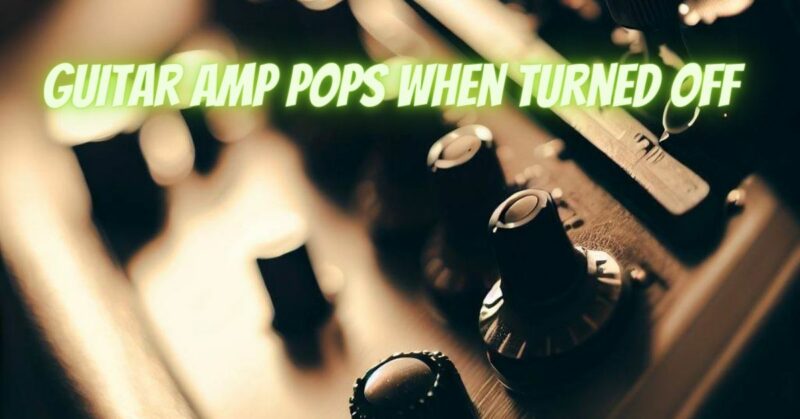The world of guitar amplification is a symphony of tones and nuances, but sometimes unexpected sounds can arise, like the popping sound that occurs when turning off a guitar amplifier. This phenomenon often prompts the question: Why does a guitar amplifier emit a popping sound upon being turned off? In this article, we’ll explore the causes behind this common occurrence, its impact, and potential ways to mitigate the issue.
Understanding the Popping Sound:
The popping sound that occurs when turning off a guitar amplifier is a result of the discharge of stored electrical energy within the amplifier’s circuitry. This energy can manifest as an audible pop sound through the amplifier’s speaker.
Causes of the Popping Sound:
- Capacitor Discharge: Amplifiers contain capacitors that store electrical charge to stabilize voltage levels and enhance performance. When the amplifier is turned off, these capacitors discharge, releasing the stored energy in the form of a pop.
- Amplifier Design: The design and circuit configuration of the amplifier can influence the severity of the popping sound. Some amplifiers are more prone to producing this sound due to their internal components and layout.
- Speaker Impulse: As the amplifier’s power supply shuts down, the sudden reduction in voltage can cause a brief fluctuation in the magnetic field of the speaker, leading to the audible pop.
Impact and Concerns:
While the popping sound is generally harmless and doesn’t indicate a malfunction, it can be a source of annoyance for both the player and those within earshot. Additionally, in situations where the amplifier is connected to recording or sound reinforcement equipment, the pop can be recorded or amplified, creating an undesirable audio artifact.
Mitigation and Prevention:
- Turn Off the Amplifier Last: If you’re using multiple devices in your signal chain (such as effects pedals), turn off the amplifier last. This can help minimize the pop that occurs when the amplifier’s capacitors discharge.
- Use a Mute Switch: Some amplifiers have a built-in mute switch that temporarily mutes the audio signal before turning off the amplifier. This can help reduce or eliminate the popping sound.
- Mute Pedal: If your amplifier doesn’t have a mute switch, you can use an external mute pedal to silence the amplifier before turning it off.
- Amplifier Modification: Some players choose to modify their amplifiers by adding circuitry that slowly discharges the stored energy, reducing the intensity of the pop. However, this should be done by a qualified technician.
The popping sound that occurs when turning off a guitar amplifier is a common occurrence caused by the discharge of stored electrical energy. While it’s generally harmless, it can be bothersome in certain situations. Employing strategies such as using a mute switch, turning off the amplifier last, or using external mute pedals can help mitigate the issue. Understanding the root cause of this phenomenon empowers guitarists to navigate the world of amplification with both sonic finesse and technical savvy.


